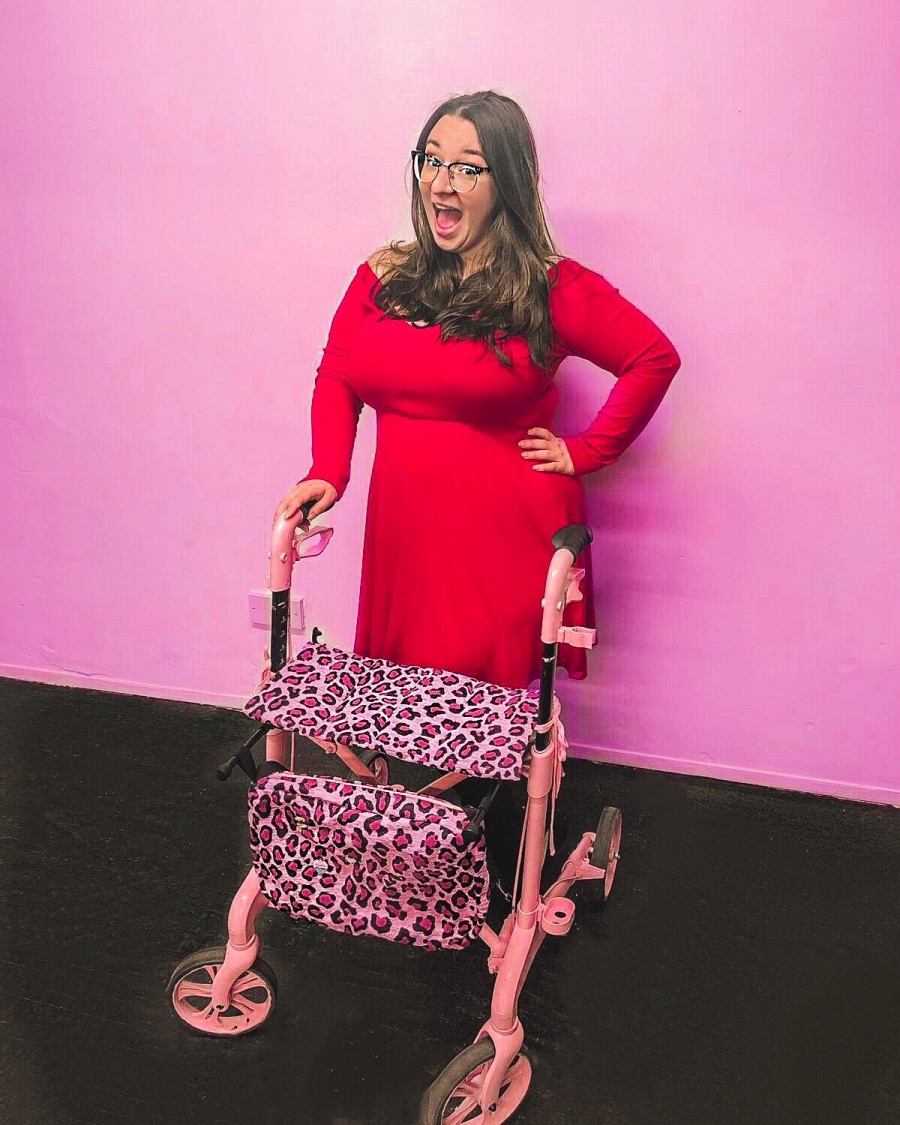-
Blog Views
909
Patchworktogether Spotlight: Hannah, Founder of Not Your Grandma’s UK
We spoke to Hannah, the founder of Not Your Grandma’s UK, who is on a mission to show the world that disability is anything but boring.
Her new website, has just launched, go have a look! It has lots of useful resources, from a podcast with interviews covering everything from community, fitness and working, to a handbook full of tips and tricks on living your best life with disability and chronic illness.
You can also follow her on Instagram!
What would you like people to know about you, fibromyalgia, and the effects of chronic illness?
Ooh, this is a tough one! Firstly, your life is not over just because you've become sick. Chronic illness can rip through your life and sometimes it feels like you are losing everything but you can and will rebuild. It might look different to how you planned, you may lose people, but you will also gain an understanding of yourself in a way you never would have before.
What inspired you to start Not Your Grandma’s?
I got fed up with the constant questions and stares from people. I also just hated how my mobility aids looked. They didn't suit my personality. I got so fed up I actually painted my walker bubble gum pink and decked it out in leopard print. Suddenly the people who had been staring and asking questions just complimented me on my style. That's when I realised I wanted to change the conversation around mobility aids and do that by making over mobility aids to fit us.
What has been the most challenging aspect of your condition?
Other people's perceptions of me. Of course, the pain and fatigue are difficult, but it's the way others react to it. Sometimes they ask invasive questions, other times they blame you for the things you can't do or see you as difficult. It's why the social model of disability spoke to me so much. It reminds me that it's society's perception of disability that's wrong, not my disability.
Do you feel there are ways in which living and working with a long term health condition provides greater benefits for employers?
I think chronically ill people make better employees. We are better at creative problem solving and knowing our limits. We can often see burn out before it happens and course correct for it far better than healthy people. We also have greater emotional intelligence often born from others not understanding our needs.
Do you feel that your experience of your health condition has been shaped by your age? Is it harder to get doctors to take you seriously?
In terms of getting doctors to understand me,that is a whole different kettle of fish! I find that as a woman and being younger has definitely affected my care. So much so that I often take someone male with me into any interactions with medical professionals to testify to the fact that I am not being hysterical or untrue when I describe my issues. Sometimes even that doesn't work. I had one specialist outright tell me my very real results were because I needed therapy. Needless to say, I exited that situation as quickly as I could.
Do you find that people in your life understand your condition and take it seriously? Do you feel able to be fully open about it?
When I still worked in TV I hid my condition for the first year, until I had a proper diagnosis. I was scared it would affect people hiring me. As TV is mostly contract work, every new place I went to I had to go through 'coming out' as disabled which I would never do until my first day in the job.
I've been lucky with family and friends. Most of them have been understanding and accepted my limitations although I know that's not everyone's experience.
Are there any organisations, charities, initiatives or communities that you’ve found particularly helpful?
Yes and no. I found an incredibly strong community on Instagram and I am so glad to get to share that with so many people. They are possibly some of closest and most supporting friends I have ever had, and half of them I've never met in real life!

How has the community you’ve fostered on Instagram helped you?
My community is my lifeline. We share everything and support each other. I went through a particularly bad patch with my health that left me housebound. Having the community to lean on and share my experiences with was invaluable.
But the best part is that it isn't one-sided, as much as they support me, I get to help them! I get some truly wonderful messages from people saying that the educational work that I do has massively helped them accept their situation. Also, people use my infographics to teach family and friends about their disability too.
What are some of the first steps we should all take as individuals to be more inclusive of those with disabilities and chronic illnesses?
Firstly, seek out disabled people to follow online and actually interact with their work. Part of learning to be inclusive is about actually taking steps to learn about how marginalised communities feel and not assuming that one person speaks for everyone. I can only talk about my own experience. So, even I make sure that I follow as many different types of disabled people as possible so that I can understand viewpoints other than my own.
What changes do you think need to be made in the workplace, or to work culture to be more accessible to, and mindful of, those with chronic illness?
I think we are starting to see those changes with Covid. Many experts are saying that because of the length this going on, many work places may choose to stay remote even after the virus has passed. This more flexible approach to working is absolutely giving disabled and chronically ill people more opportunities to find work that fits around their illness but we also need to take it a step further and create flexible working hours as well.
What are the most effective coping mechanisms you’ve found for living with your condition during difficult periods?
Leaning into my community for sure. Having people that just get it and don't try to fix you is honestly wonderful. Especially when the rest of the world doesn't understand what you are going through.
How do you think a platform like Patchwork Hub could help people with disabilities and chronic illnesses?
Being able to showcase how skilled our community is. There are so many people in our community with really useful skills. But because of non-flexible working patterns so many of us don't work. Employers are often hesitant to employ someone disabled, so being able to showcase what we can do is so important.
Tags
All Tags
Ability Connect Academy for Disabled Journalists Academy for Disabled SEO Specialists Access2Funding Accessibility Accessibility information Accessibility int he workplace Accessibility ramps Accessible education Accessible locations Accessible places Acid reflux Adaptive fashion Advocacy AI Aleto Foundation All Saints Alt text Aspiring Entrepreneurs with Disability Development Programme Assistive technology Autism Awareness Barriers Beth Kume-Holland Blog Budgeting Bullying BUPA Burnout Business Business Disability Forum Business model creation Business skills Business workshop Businesses Cancer Candidates Captions Cash flow Cerebral palsy Characters Charity Charity sector Chronic pain Closed captions Clothes Clothing Cognitive disabilities Comfort zone Communication Community networks Companies Company Company Corner Company culture Confidence Confucius Consultant Consultation Content creator Content designer Data talent Diagnosis Difference Digital and social media marketing Digital transformation Disabilities Disability advocate Disability advocates Disability and Neurodiversity Network Disability awareness Disability Awareness Training Disability community Disability confident Disability Confident Leader Disability employment Disability inclusion Disability news Disability Policy Centre Disability Pride Disabled Disabled candidates Disabled community Disabled founders Disabled people Disabled People’s Direct Action Network Disabled talent Disabled team Disabled-led Diverse Diverse workforce Diversity Diversity and inclusion Diversity Project Diversity Recruitment Platform Domestic violence Dysfluency ED&I EDDP Education Education and resource platform Employment opportunities Employment platform Empowerment Equality Act 2010 Ethnic minorities Eventbrite Expert teachers Expert training Fashion Fashion industry Fathom Feedback Finances Financial goals Financial planning Financial plans Financial services Financial services sector Flexible work Freelance FTSE 100 Fund management GAIN Game Gaming Gareth Walkom Garment technologist Gastrointestinal conditions Gem Turner Gender Gender Networks Grant Logan Guide dog Healthcare Hidden talent pool Homeworking Hospice UK Compassionate Employers Programme HR Hybrid working Ian MacKenzie Inclusion Inclusive culture Inclusive workforce Inclusivity India Inspiration Intellectual capabilities Interview process Interviews Investments Invisible disabilities Invisible disability Isaac Harvey Isaac Harvey MBE Istituto Marangoni Jack Wills Job descriptions Job interviews Job opportunities Job vacancies Journalism Journalists Learning disability Leeds Leeds trinity university Legislation LGBT Great LGBTQ+ Limb-pelvic hypoplasia LinkedIn LinkedIn influencer Listening service Lloyds Bank London London Fashion Week Long-term health condition Long-term health conditions Mapping days Mark Esho Matt Pierri Maya angelou Meta Metaverse Migrants Motivation Multinational firm Musculoskeletal conditions National Council for the Training of Journalists NCTJ Neurodivergence Neurodivergent Neurodiverse Neurodiversity consultant Neurodiversity space Neurotype Neurotypes New Delhi News Non-disabled founders Non-profit Novos OBS Occupational health Office environment Organisations Partially sighted Partnership Patchworkers People Phase Eight Phone calls Physical disabilities Pirate video games Policy Poverty Presentations Pride Network Primark Processes and systems Professional Women’s Network Progress Together Public speaking Puneet Singh Singhal Race Race and Ethnicity Network Raising awareness Registered blind Remote course Remote education Remote learning Remote work Removing barriers Resilience Revenue streams Rights School Scoliosis Scope Search engine optimisation Selection process Self-employed Self-employment Senior staff Sexuality Shaw trust Shaw trust power 100 list Sign language SJP Small Business Britain Social impact Social mission Social mobility Social-emotional learning Social-emotional learning platform Software Speaking situation Speech differences Speech disabilities Speech impediment Spotlight series Spotlight stories Ssstart St. James’s Place Charitable Foundation Staff Stammer Stammering Stonewall Stories Stuttering Sustainable change Sweaty Betty Target market Tech industry Tech talent TEDx Tesco Think tank Training Underrepresentation Unhidden Unhidden Clothing Universities University of Leicester Vanessa Castañeda Gill Victoria Beckham Video editor Video game Vimeo Violence Virtual reality VR Wealth management Web accessibility Wheels and Wheelchairs Women Work environment Work from home Working conditions Working Families Group Working from home Workplace adjustments Youth Zoom Abc Ability Today Access to work Accessibility in the workplace Accessibility test Accessible work Acting Adhd Adjustments Administrative Adrian lord Advice Advocacy and campaigns Allparty parliamentary group for inclusive entrepreneurship American civil rights movement Android Anglonorman App Artificial intelligence Bad grammar Barriers to work Bbc Benefits Blind persons act Blue badge Blue badge service specialists Care Career Carer Celtic languages Center on everyday lives of families Ceo Cfs Chloe tear Chronic fatigue syndrome Chronic health condition Chronic illness Commodo aute beatae Community Community story Community, community story, founder, feature, accessible work, disability employment gap, making a difference Companies house Compressed hours Computer science Computers Coronavirus Councils Covid19 Crystal mark standard Deaf Design Dialects Dictionary Digital accessibility Disability Disability discrimination act Disability employment gap Disability rights movement Disability services Disabled peoples direct action network Disabled persons employment act Disabled-led organisation Easy read Edit Tag Test 2 Email address Employer Spotlight Employers Employment English English speakers Entrepreneur Entrepreneurship Epilepsy Equality Equality act Equality and diversity Equality of access Esources, disability, disability services, support services, community story, features, adjustments, social support network Esse vero eum nisi a Eugenics Facebook Feature Features Fibromyalgia First world war Flexi Flexible working Flexitime Flextime Founder Francesco cirillo Freelancing French Gcses Gdpr General data protection regulation Good Good grammar Google Government policy Government support Graduate Graduates Grammar Grammar schools Health Health condition Health conditions Hearing impairment Help And Support Tags History History of language Holistic Ico Impact Imposter syndrome Inclusive entrepreneur network Inequalities Inequality Information commissioners office Information governance Instagram Internet Jacqueline winstanley Laborum Magna moles Language Latin Law Learning difficulties Lexicographers Limited company Local councils Local government Making a difference Marketing strategy Mecfs Medical conditions Medical model of disability Medical vs social models of disability Medicines Mental health Middle english Mindfulness Mlm Mobility issues Molestias quod sapie Multilevel marketing Nam eaque iure aut v National league of the blind Neurodiversity Nihil corporis aliqu Niya Normans Old english Old french Onboarding and retention Online Out of work Oxbridge Parent Passwords Patchwork hub Payment details Planning Planning for work Podcasts Pomodoro Preposition Private schools Psychiatric Psychiatry Punctuation Qui voluptatem debi React Reasonable adjustments Recruitment Remote working Resources Resources and support Rest Retinopathy of prematurity Sales Scam Search engine Second world war Shell shock Slang Sociability Social Cipher Social interactions Social media Social model of disability Social support network Socialising Spelling Spoken language Spotlight series Spotlight stories St. James’s Place Standard english Startup State schools Student Students Studying Suffragette movement Support Support services Syntactician Syntax Tag Technology The Disability Policy Centre The elderly Then barbara met alan Trafalgar square Turkish United nations Universal inclusion University University of arts london University of cambridge University of hertfordshire University of hull University of leeds University of oxford Victoria Jenkins Visual impairment War Ways of working West germanic dialects William shakespeare Windsor consultations WithVR Wordpress Work structure Workforce recruitment Working environment Workplace barriers World war one World war two Young carer




